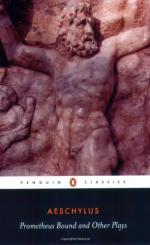|
This section contains 14,884 words (approx. 50 pages at 300 words per page) |

|
SOURCE: Spatz, Lois. “Aeschylus: Citizen and Poet” and “Persians: Monodrama.” In Aeschylus, pp. 1-35. Boston: Twayne Publishers, 1982.
In the following essays, Spatz discusses Aeschylus's life, his society, and the state of theater in his time, and provides an overview of the Persians, including analyses of its staging, diction, and imagery.
Life and Times
This monument covers Aeschylus the Athenian, Euphorion's son, who died in the wheatlands of Gela. The sacred grove of Marathon with its glories can speak of his valor in battle. The long-haired Persian remembers and can speak of it too.
So reads the epitaph of Athens's first great tragic poet. This verse was composed by Aeschylus himself, according to Pausanias, the second-century a.d. geographer who wondered why the playwright neglected to mention his tragedies.1 But it is not surprising that this particular poet who witnessed the birth of the Athenian democracy and then participated...
|
This section contains 14,884 words (approx. 50 pages at 300 words per page) |

|


